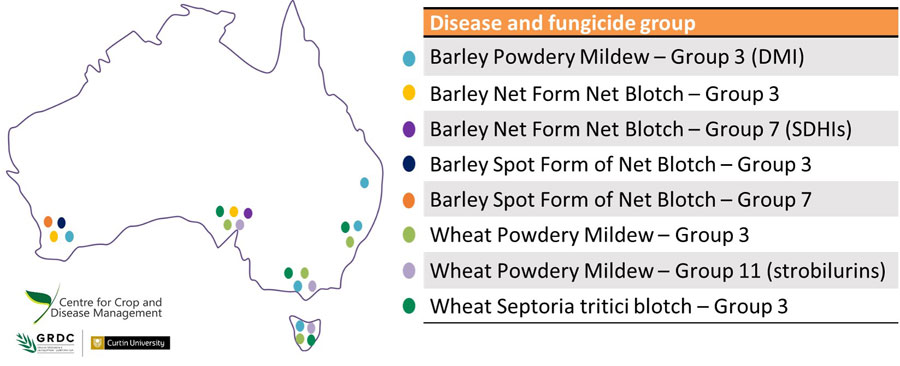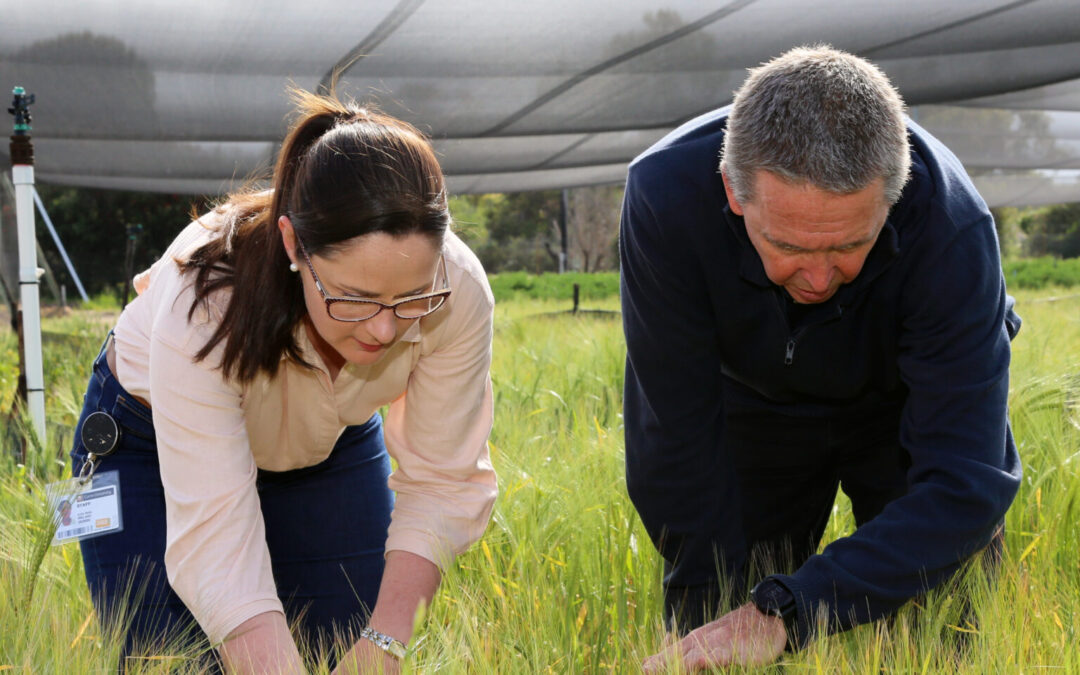Courtesy: GRDC GroundCover, AFREN support network to tackle fungicide resistance | Groundcover (grdc.com.au)
The Fungicide Resistance Five
Five key actions to help growers maintain control over fungicide resistance, regardless of their crop or growing region:
- Avoid susceptible crop varieties.
- Rotate crops – use time and distance to reduce disease carryover.
- Use non-chemical control methods to reduce disease pressure.
- Spray only if necessary and apply strategically.
- Rotate and mix fungicides / mode of action groups.
Resistance detected
With the right support, growers and advisers can successfully manage and prevent fungicide resistance.
With the increasing use of fungicides for disease control in crops over the past 20 years, there has been a corresponding rise in cases of fungicide resistance in many common pathogens.
A typical case was the identification of spot form net blotch (SFNB) with resistance to the popular seed treatment fungicide fluxapyroxad (Systiva®, Group 7, SDHI), in a barley crop at Cunderdin in Western Australia in 2020.
Similar resistance has been detected in net form net blotch (NFNB) on South Australia’s Yorke Peninsula. In both locations, there are indications of dual resistance developing in the net blotches to both SDHIs and DMIs (Group 3). The DMIs include many popular azole chemistries such as propiconazole, prothioconazole and tebuconazole. This could seriously limit grower capacity to control net blotches.
Figure 1: Fungicide resistance in Australian cereal crops. Information current as at October 2020. Dots point to the state only, not area where resistance was discovered.

Source: Centre for Crop and Disease Management, Curtin University
No growing region or crop can be considered immune as fungicide resistance has been detected in diseases of wheat and barley (Figure 1) and canola across all growing regions.
Risk factors
To improve awareness of the risk factors and steps that can be taken to optimise fungicide use in cropping programs, GRDC has established the Australian Fungicide Resistance Extension Network (AFREN).
Coordinated by the Centre for Crop and Disease Management (CCDM) at Curtin University, AFREN brings together regional plant pathologists, fungicide resistance experts, and communication and extension specialists from across the country.
Project partners include AgCommunicators, Agriculture Victoria, the Western Australian Department of Primary Industries and Regional Development, FAR Australia, Independent Consultants Australia Network (ICAN), Marcroft Grains Pathology, the South Australian Research and Development Institute, the universities of Melbourne and Southern Queensland, NSW Department of Primary Industries and the Queensland Department of Agriculture and Fisheries.
AFREN coordinator Dr Kylie Ireland says fungicide resistance is a serious issue that threatens both the short-term yield and profitability of affected paddocks, as well as the long-term viability of available fungicides.
“Fungicide resistance is almost always linked to repeated fungicide use and a suite of poor agronomic or integrated disease management decisions. What we’ve seen is that where growers aren’t rotating crops, managing stubble or strategically selecting less-susceptible varieties, fungicide resistance has developed,” Dr Ireland says.
“This means growers have a lot of capacity to manage and prevent its occurrence.”
Support network
AFREN works to provide growers, agronomists and grower groups with a range of information and support resources. These resources are designed to be crop and region-specific, to better meet grower needs.
Fungicide resistance is a serious issue that threatens both the short-term yield and profitability of affected paddocks, as well as the long-term viability of available fungicides.
The AFREN website provides growers and advisers with easy access to the latest news on fungicide resistance cases as well as webinars, fact sheets and an Australian-first fungicide resistance management guide for Australian grain crops.
“The strength of the AFREN project lies in the diverse experience and knowledge of its participants,” Dr Ireland says.
“Combining scientific expertise with the industry insights from GRDC and CropLife Australia means AFREN can deliver relevant, independent, best practice management advice that growers and advisers can apply with confidence.”
More information: Dr Kylie Ireland, 08 9266 3541, kylie.ireland@curtin.edu.au, Australian Fungicide Resistance Extension Network (AFREN), afren@curtin.edu.au

